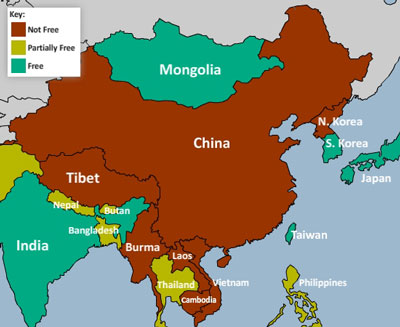




Cambodia was among 25 countries whose freedom levels plunged in 2010 amid an erosion of civil rights and political liberties in the tightly-ruled Southeast Asian state, according to an annual survey released Thursday by global watchdog Freedom House.
North Korea and Burma were ranked among the nine “worst of the worst” countries by the Washington-based group, while China was singled out for the continued imprisonment of Nobel laureate Liu
Xiaobo, and harassment of his family and supporters in what was seen as the “most notorious case” of events challenging global
freedom in 2010.
Freedom House designated Burma, Cambodia, China, Laos, North Korea, and Vietnam in a group of countries deemed to be “not free” in its Freedom in the World report.
"Cambodia received a downward trend arrow due to the government’s consolidation of control over all aspects of the electoral process, its increased intimidation of civil society, and its apparent influence over the tribunal trying former members" of the genocidal Khmer Rouge regime, the report said.
Sarah Cook, Asia research analyst for Freedom House, said civil rights and political liberties of Cambodians took a tumble.
“On civil liberties it was related to this point of freedom of assembly, kind of an increased crackdown on protests and limited space for demonstrations. While on the political side, it had to do really with this kind of government intimidation of opposition leaders like Sam Rainsy being pushed out of the country and essentially marginalized,” she said.
‘Worst of the worst’
On North Korea, Cook said the nuclear-armed and reclusive country remains “deeply” within the “worst of the worst” category in Freedom House's ratings and is “arguably the most repressive regime and country in the world.”
While Burma held its first elections in two decades in November last year, the report said that the electoral process was controlled to ensure a victory by the military regime's proxy party. Nobel laureate and democracy icon Aung San Suu Kyi’s National League for Democracy opposition party boycotted the polls.
Still, the report noted that Burma's new electoral laws allowed for the registration and participation of 37 opposition and independent ethnic minority parties, several of which won election to the new assembly.
“It was kind of this balance between a situation that was far from a free and fair election, but nonetheless in terms of political rights scores, there were several small score improvements, given the ability to really mobilize and organize and as political parties running up to the election,” Cook said.
Censorship
